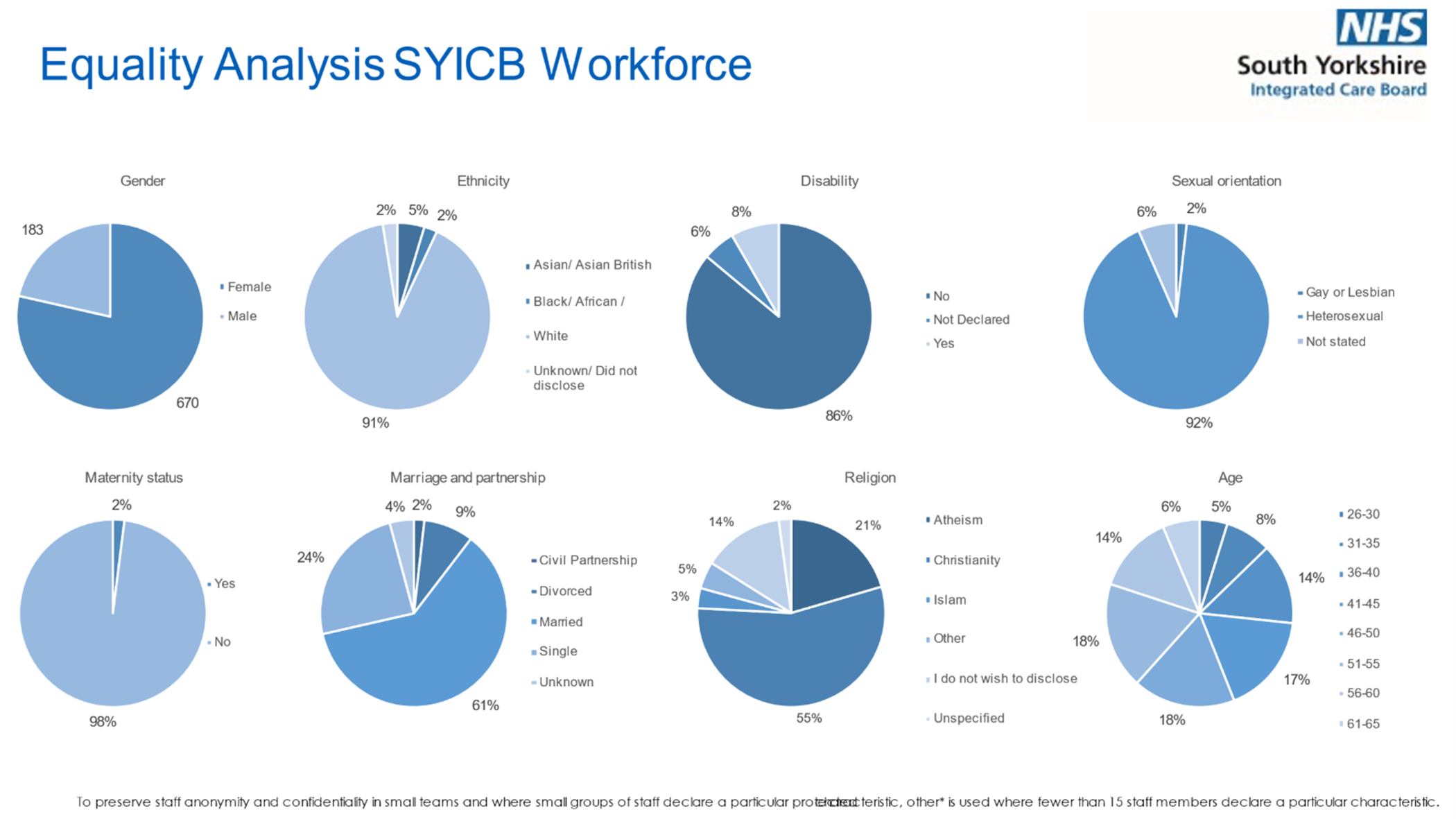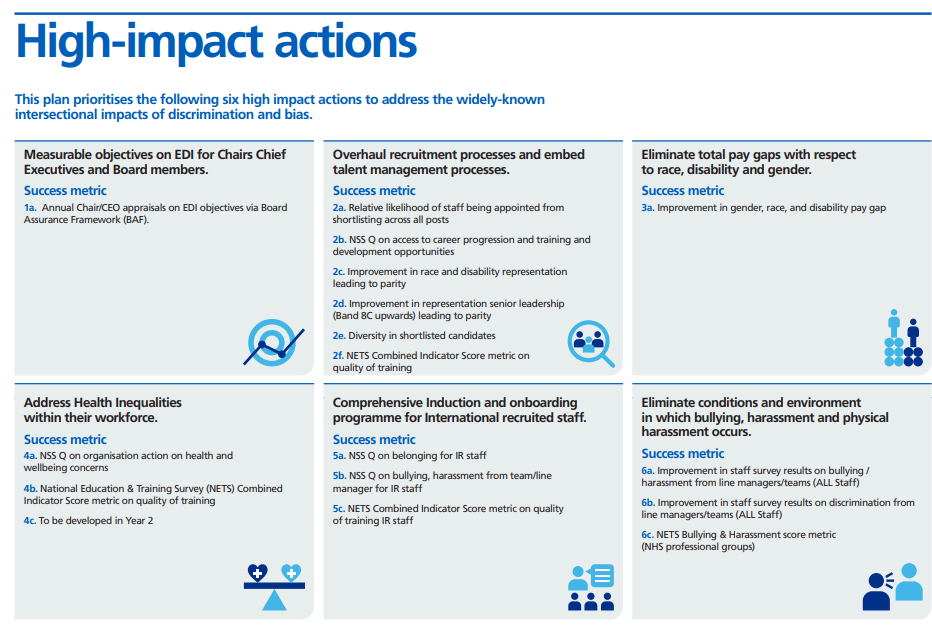Introduction
In this section, you will find out about:
- our approach to equality, diversity and inclusion;
- NHS mandated standards relating to equality, diversity and inclusion (EDI); and
- how we report on EDI-related progress.
We believe having a focus on improving equality, diversity and inclusion will result in better outcomes for our people, both our population and our workforce.
Since forming as a new organisation in July 2022, we have been working on embedding the work of our predecessor clinical commissioning groups (CCGs) and realigning the priorities to the new South Yorkshire Integrated Care Board.
This sets out how we are working to comply with our Public Sector Equality Duty, as set out in the Equality Act 2010 and in the supporting regulations.
You can find the details of the general and specific duties on the government website.
The general duty requires public authorities, in the exercise of their functions, to have due regard to the need to:
- eliminate unlawful discrimination, harassment, victimisation, and any other unlawful conduct prohibited by the act.
- advance equality of opportunity between people who are and people who do not share a relevant protected characteristic.
- foster good relations between people who share and people who do not share a relevant protected characteristic.
The characteristics protected by the Equality Act (2010) are:
- Age
- Disability
- Sex (gender)
- Gender reassignment
- Sexual orientation
- Race
- Religion and/or belief
- Pregnancy and maternity
- Marriage and civil partnership
We also consider other groups such as:
- Carers
- Military veterans
- Asylum seekers
- Refugees
- People from deprived areas
In terms of the specific duties, as an employer with over 250 employees we are required to:
- publish one or more equality objectives at least every 4 years.
- publish information on general duty compliance with regards to people affected by our policies and practices every year.
- publish information on general duty compliance with regards to our employees every year.
- publish gender pay gap data by 31 March every year.
Please click here to read the full report
Common to all our predecessor CCG's equality objectives was the aim to ensure that we were able to ensure equity and inclusion in access and outcomes to health and care services through our commissioning processes. Our focus in 2023 and 2024 has been to develop, implement and embed a new process of impact assessments, using insights from patient experience and population data to ensure we commission services and develop policies that will help us achieve this.
We have developed an approach which brings together equality, health inequality, quality, and sustainability impact assessments.
We have implemented an impact assessment panel which meets monthly to review all the impact assessments and provides peers support and challenge. Panel members include people with expertise in each of the impact areas, including access to data from patient experience, employee experience and population health.
Our aim is that all commissioning decisions and policies do this thorough impact assessment as part of the development process.
Completed impact assessments will be published on our website.
Our objective is that ongoing work will be undertaken to embed this process fully, to continue to develop the data sources to support the process and to ensure that we share learning from the assessments to support future service development and provision.
The ICB carried out a public involvement campaign in 2022/3 to support the development of the Joint Forward Plan. This campaign was called ‘What matters to you about your health and wellbeing?’. This took place over a short period of time, and we know we did not reach all parts of our population.
We have kept the involvement process going since then and feedback was that we needed to make specific efforts to engage with communities who have been underserved by health and care. Throughout 2023/4 we have carried out this engagement to ensure that we have a better connection with all parts of our population. We have also used this engagement to support the development of our refreshed Start with People Engagement Strategy which is all about how we intend to involve people in service development and positive action programmes. We have used population data in respect of protected characteristics to assist with this involvement.
Demographic data relating to our employees

Areas of focus in respect of representation when compared to South Yorkshire population data include:
-
Ethnic diversity generally but specifically at non-executive and executive director level
-
Age in respect of people below the age of 40.
Actions being taken to address representation at board level include an Associate Non-Executive Director development programme and a reciprocal mentoring programme for aspirant leaders from an ethnic minority background and established leaders, which is now running its second cohort, with a third planned.
Staff Survey Results for 2023
The annual NHS staff survey provides information on how safe and well at work our employees feel. The results in this respect were:
-
Employees experiencing physical violence from patients – 1.24%
-
Employees experiencing physical violence from managers – 0%
-
Employees experiencing physical violence from staff/colleagues – 0%
-
Employees experiencing harassment, bullying from patients – 10.23%
-
Employees experiencing harassment, bullying from managers – 7.07%
-
Employees experiencing harassment, bullying from staff/colleagues – 7.13%
-
Employees experiencing unwanted behaviour of a sexual nature from patients – 0.53%
-
Employees experiencing unwanted behaviour of a sexual nature from staff - 1.41%
Read all our NHS staff survey results from 2023 (results published in 2024):
- Breakdown report
- Benchmark report
- Interactive tool (search for organisation NHS South Yorkshire ICB)
We are developing action plans to address and try to eliminate these experiences our employees are reporting. This is the first survey to record experiences of unwanted behaviour of a sexual nature and we will use this information to support our work related to the implementation of the NHS Sexual Safety Charter, which we are a signatory to.
We also have information relating the experience of those employees from an ethnic background and those who are disabled. This information is captured in a Workforce Race Equality Standard (WRES) report and a Workforce Disability Equality Standard (WDES). Note: the predecessor organisations did not have to complete the WDES due to their size and the small numbers involved, however a section of the staff survey covers some of the same information.
Training and development regarding equality, diversity, and inclusion
In addition to our statutory and mandatory e-learning we have also run an inclusive leadership session for our executive directors, we have regular lunchtime learning sessions where we share experience and progress in certain topic areas, such as sexual safety, dyslexia in the workplace, menopause, and racism.
We also share other NHS organisations training resources with our employees to maximise our ability to provide as much development in this area as possible.
Through the South Yorkshire EDI leads network we work together to support activities, celebration events and join up staff networks.
Staff Networks
We have four staff networks now established in the integrated care board:
- Race equality
- Disability
- Carers
- LGBTQ+
Each network has an executive director sponsor.
We included our staff network chairs in a steering group relating to a recent organisational change. This was a specific action to increase representation of protected characteristics in the decision making relating to this programme which affected all employees.
The Equality Delivery System (EDS22) is a system that helps us as an NHS organisation improve the services we provide for our local communities and provide better working environments, free of discrimination for those who work in the NHS. This improvement approach is designed to help us achieve our Public Sector Equality Duty.
Domain 1 of the EDS is focussed on the services commissioned by our organisation.
In 2023/4 we have focussed on three services areas:
- Maternity and Neonatal services – leading to the development of a comprehensive Equity of Access Plan which is now in year two of delivery.
- Commissioning of stammering services where we have an indication of inequalities in access.
- People who are D/deaf and their access to services, including appropriate interpreting support and accessible communications.
Read more information relating to the review of these services.
With the introduction of NHS England’s EDI Improvement Plan in June 2023, we are now also aligning our work to the 6 identified High Impact Actions:

Progress in 2023 on the High Impact Actions
High Impact Action 1:
All our Board members have at least one EDI objective.
High Impact Action 2:
Our recruitment and selection processes are being reviewed. Our WRES data indicates that there is a relative likelihood of white staff being appointed from shortlisting compared to BAME staff is 0.96 time greater.
In our organisation we need to focus our talent management on non-clinical roles at band 7 to improve representation at the more senior levels in the future. In clinical roles the focus is more at band 8b.
As previously mentioned, ethnic diversity representation in band 9 and VSMs is an issue in non-clinical roles.
High Impact Action 3:
Our gender pay gap has been prepared for the first time for most of our organisation due to the relative size of the predecessor CCGs. This shows that the:
- Women earn 84p for every £1 that men earn when comparing median hourly pay. Women’s median hourly pay is 16.4% lower than men.
- When comparing mean (average) hourly pay, women’s mean hourly pay is 33.4% lower than men’s.
- In the ICB women occupy 65% of the highest paid jobs and 83% of the lowest paid jobs.
We are currently developing actions to address this gap and will also include analysis relating to ethnicity and disability pay gap.
High Impact Action 4:
We are doing a lot of work to understand the health inequalities in our workforce. Prevention is a key part of our approach and is about:
- Assessing what affects workforce health and wellbeing most and what support colleagues need.
- Promoting and raising awareness about the support already available
- Do more of the activities we know are most effective
We are taking a population health approach where we recognise the diversity of the workforce, explore what influences health and wellbeing and uses data and evidence to plan and monitor what works to prevent and tackle issues. This includes being mindful of the specific needs of people from a range of ethnic groups, colleagues with disabilities and long term conditions, those who have caring responsibilities at home, and many other diverse characteristics that make up our workforce.
This is set out in our Health and Wellbeing roadmap (Download pdf document) which is a South Yorkshire health and care approach to improving health and wellbeing.
High Impact Action 5:
The ICB is leading a programme of support for internationally recruited and educated people across South Yorkshire. We have recruited over 1600 people from overseas into the NHS, the vast majority in nursing, but also some Midwives and Allied Health Professionals.
Our approach to pastoral support has been effective with high levels of retention, but the data shows that we need to pay attention to career progression beyond band 5.
High Impact Action 6:
We are working on developing our culture in our new organisation. We have co-produced our values and behaviours and are continuing to work together on how we embed these in our organisation.